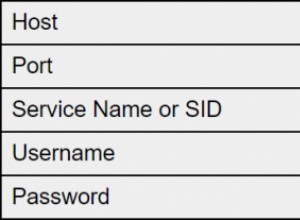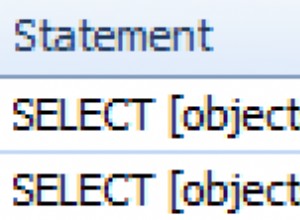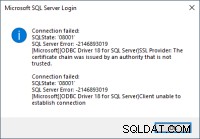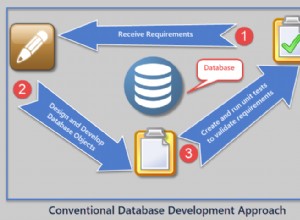Sono d'accordo sul fatto che questo è un design davvero pessimo. Prova questo se non puoi cambiare quel design:
select distinct id, trim(regexp_substr(value,'[^,]+', 1, level) ) value, level
from tbl1
connect by regexp_substr(value, '[^,]+', 1, level) is not null
order by id, level;
USCITA
id value level
1 AA 1
1 UT 2
1 BT 3
1 SK 4
1 SX 5
2 AA 1
2 UT 2
2 SX 3
3 UT 1
3 SK 2
3 SX 3
3 ZF 4
Ringraziamo questo
Per rimuovere i duplicati in modo più elegante ed efficiente (crediti a @mathguy)
select id, trim(regexp_substr(value,'[^,]+', 1, level) ) value, level
from tbl1
connect by regexp_substr(value, '[^,]+', 1, level) is not null
and PRIOR id = id
and PRIOR SYS_GUID() is not null
order by id, level;
Se vuoi un approccio "ANSIer" scegli un CTE:
with t (id,res,val,lev) as (
select id, trim(regexp_substr(value,'[^,]+', 1, 1 )) res, value as val, 1 as lev
from tbl1
where regexp_substr(value, '[^,]+', 1, 1) is not null
union all
select id, trim(regexp_substr(val,'[^,]+', 1, lev+1) ) res, val, lev+1 as lev
from t
where regexp_substr(val, '[^,]+', 1, lev+1) is not null
)
select id, res,lev
from t
order by id, lev;
USCITA
id val lev
1 AA 1
1 UT 2
1 BT 3
1 SK 4
1 SX 5
2 AA 1
2 UT 2
2 SX 3
3 UT 1
3 SK 2
3 SX 3
3 ZF 4
Un altro approccio ricorsivo di MT0 ma senza regex:
WITH t ( id, value, start_pos, end_pos ) AS
( SELECT id, value, 1, INSTR( value, ',' ) FROM tbl1
UNION ALL
SELECT id,
value,
end_pos + 1,
INSTR( value, ',', end_pos + 1 )
FROM t
WHERE end_pos > 0
)
SELECT id,
SUBSTR( value, start_pos, DECODE( end_pos, 0, LENGTH( value ) + 1, end_pos ) - start_pos ) AS value
FROM t
ORDER BY id,
start_pos;
Ho provato 3 approcci con un set di dati di 30000 righe e 118104 righe restituite e ho ottenuto i seguenti risultati medi:
- Il mio approccio ricorsivo:5 secondi
- Approccio MT0:4 secondi
- Approccio Mathguy:16 secondi
- Approccio ricorsivo MT0 no-regex:3,45 secondi
@Mathguy ha anche testato con un set di dati più grande:
In tutti i casi la query ricorsiva (ho testato solo quella con regularsubstr e instr) fa meglio, di un fattore da 2 a 5. Ecco le combinazioni di # di stringhe / token per stringa e tempi di esecuzione CTAS per gerarchico vs. ricorsivo, gerarchico prima . Tutti i tempi in secondi
- 30.000 x 4:5 / 1.
- 30.000 x 10:15 / 3.
- 30.000 x 25:56 / 37.
- 5.000 x 50:33 / 14.
- 5.000 x 100:160 / 81.
- 10.000 x 200:1.924/772




